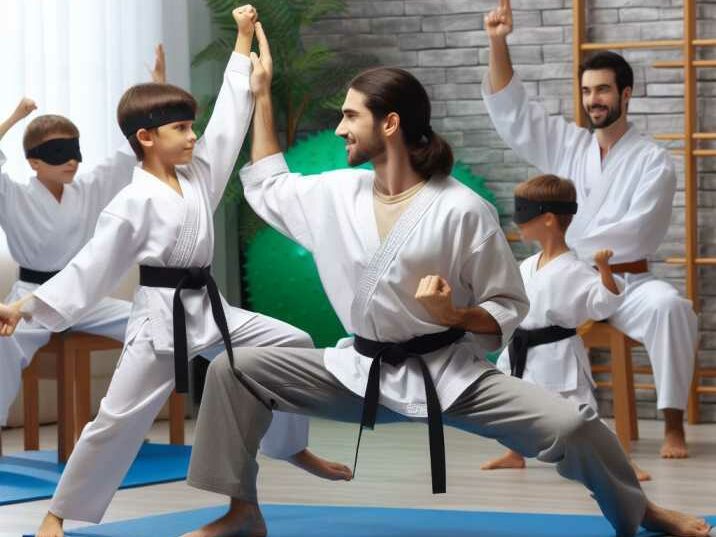Introduction:
Table of Contents
In the realm of martial arts, Kung Fu stands out as a discipline that encompasses both physical prowess and mental fortitude. But can it be adapted of Kung Fu for individuals with sensory processing disorders? This question prompts us to delve into the depths of both the art of Kung Fu and the intricacies of sensory processing disorders to uncover potential synergies. In this article, we’ll explore the adaptability of Kung Fu for individuals with sensory processing disorders, shedding light on the benefits and considerations involved.

Understanding Sensory Processing Disorders:
Before delving into the adaptation of Kung Fu, it’s essential to understand what sensory processing disorders entail. These disorders affect the way the brain processes sensory information, leading to challenges in effectively responding to stimuli from the environment. Individuals with sensory processing disorders may experience hypersensitivity or hyposensitivity to various sensory inputs, such as touch, sound, sight, taste, and smell.
The Potential of Kung Fu Adaptation:
Kung Fu, with its emphasis on discipline, focus, and controlled movements, holds promise for individuals with sensory processing disorders. Through tailored techniques and a supportive environment, Kung Fu can offer a range of physical and mental benefits, including improved coordination, concentration, self-confidence, and emotional regulation.
Adapting Kung Fu Techniques:
Adapting Kung Fu for individuals with sensory processing disorders involves modifying techniques to suit their unique needs and preferences. This may include:
Slow and Controlled Movements:
Emphasizing deliberate, slow movements allows individuals to better process and respond to sensory input, reducing feelings of overwhelm.
Sensory Integration Activities:
Incorporating sensory integration activities within Kung Fu training sessions can help individuals regulate their sensory experiences and improve their overall tolerance.
Visual Cues and Demonstrations:
Providing clear visual cues and demonstrations helps individuals with sensory processing disorders better understand and imitate Kung Fu movements.
Individualized Instruction:
Tailoring instruction to accommodate each individual’s sensory preferences and challenges ensures a personalized and effective learning experience.

Benefits of Adapted Kung Fu:
Adapting Kung Fu for individuals with sensory processing disorders offers a multitude of benefits, including:
- Improved Motor Skills: Practicing Kung Fu helps individuals develop better coordination, balance, and motor skills.
- Enhanced Focus and Attention: The discipline and concentration required in Kung Fu training promote improved focus and attention control.
- Stress Reduction: Engaging in Kung Fu can serve as a form of stress relief, promoting relaxation and emotional well-being.
- Boosted Self-Confidence: Mastering Kung Fu techniques fosters a sense of achievement and self-confidence in individuals with sensory processing disorders.
Challenges and Considerations:
While the adaptation of Kung Fu holds tremendous potential, it’s essential to acknowledge and address challenges that may arise. These may include:
- Sensory Overload: Individuals with sensory processing disorders may experience sensory overload during Kung Fu training sessions, necessitating breaks and sensory regulation strategies.
- Communication Barriers: Clear communication and understanding between instructors and participants are crucial to ensure effective adaptation and support.
- Individual Variances: Sensory processing disorders manifest differently in each individual, requiring tailored approaches to accommodate diverse needs and preferences.
Table of Information Kung Fu for individuals with sensory processing disorders:
| Benefits of Adapted Kung Fu for Individuals with Sensory Processing Disorders |
|---|
| Improved motor skills |
| Enhanced focus and attention |
| Stress reduction |
| Boosted self-confidence |
Conclusion:
In conclusion, the adaptation of Kung Fu for individuals with sensory processing disorders opens doors to empowerment, inclusion, and holistic well-being. By embracing modifications and fostering a supportive environment, Kung Fu instructors can help individuals with sensory processing disorders unlock their full potential and thrive both on and off the training mat.
FAQs:
- Can Kung Fu benefit individuals with sensory processing disorders?
- Yes, adapted Kung Fu techniques can offer a range of physical and mental benefits for individuals with sensory processing disorders, including improved coordination, focus, and self-confidence.
- What modifications are made to accommodate individuals with sensory processing disorders in Kung Fu training?
- Modifications may include slower movements, sensory integration activities, clear visual cues, and individualized instruction tailored to each participant’s needs.
- How can sensory overload be managed during Kung Fu training sessions?
- Sensory overload can be managed through breaks, sensory regulation strategies, and creating a supportive environment where participants feel comfortable expressing their needs.
- Are there any communication barriers to consider when adapting Kung Fu for individuals with sensory processing disorders?
- Clear communication between instructors and participants is essential to ensure effective adaptation and support, minimizing potential communication barriers.
- What are some of the key benefits of adapted Kung Fu for individuals with sensory processing disorders?
- Adapted Kung Fu can lead to improved motor skills, enhanced focus and attention, stress reduction, and boosted self-confidence in individuals with sensory processing disorders.


